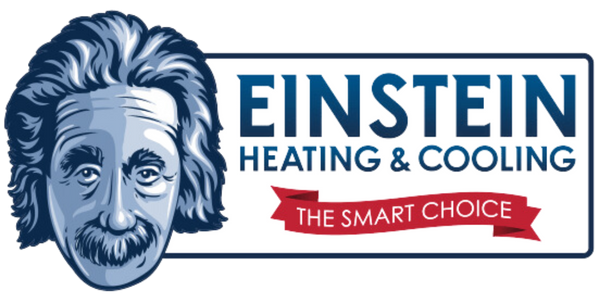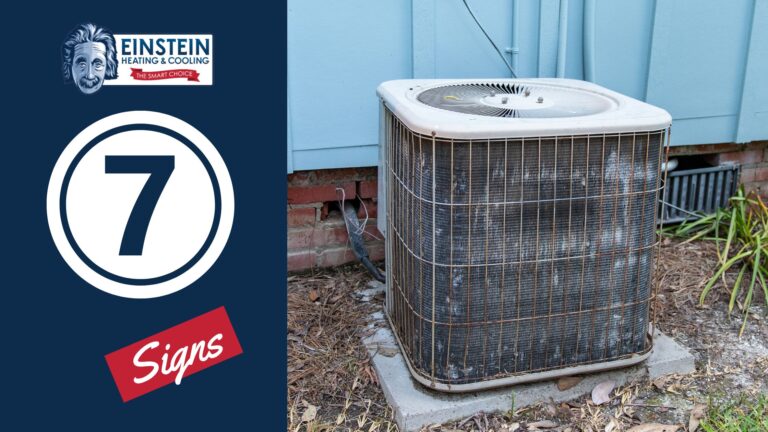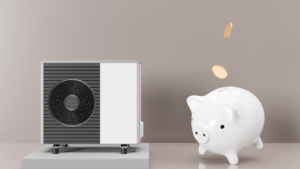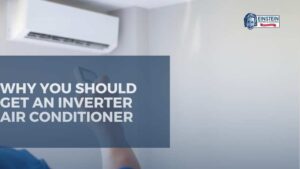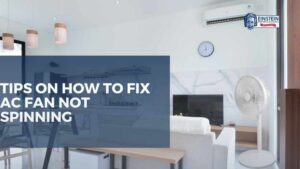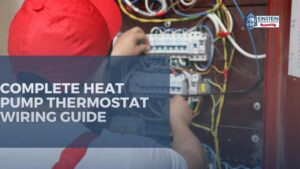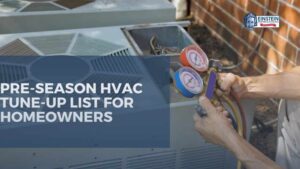Your HVAC (Heating, Ventilation, and Air Conditioning) system plays a vital role in keeping your home comfortable throughout the year. However, like any mechanical system, it has a limited lifespan. Over time, wear and tear can take a toll on its efficiency and performance, leading to various issues. Recognizing the signs that indicate it’s time to replace your HVAC system is crucial to ensure optimal comfort, energy efficiency, and cost savings.
In this blog post, we will explore seven telltale signs that indicate it may be time to replace your HVAC system. By paying attention to these signs and taking appropriate action, you can avoid sudden breakdowns, high energy bills, and discomfort. Let’s dive in!
- Age of the System
One of the primary factors to consider when determining whether to replace your HVAC system is its age. Most HVAC systems have an average lifespan of 10 to 15 years. As your system approaches or exceeds this range, it becomes increasingly prone to malfunctions and reduced efficiency. If your HVAC system is older and requires frequent repairs, it might be a wise decision to invest in a new one.
he age of your HVAC system is a crucial factor to consider when evaluating whether it’s time for a replacement. Most HVAC systems have a typical lifespan of 10 to 15 years. As your system approaches or surpasses this range, it’s important to be aware of the potential issues that can arise.
As HVAC systems age, their components begin to wear out, and their efficiency declines. Older systems may struggle to maintain consistent temperatures, leading to discomfort in your home. Moreover, aging systems are more likely to experience malfunctions and breakdowns, resulting in costly repairs and inconveniences.
Even if your older HVAC system is still operational, it may not be operating at its optimal efficiency. Modern HVAC systems incorporate advancements in technology and energy efficiency, providing significant improvements over older models. By upgrading to a new system, you can benefit from enhanced performance, increased energy efficiency, and improved comfort.
It’s also important to note that frequent repairs on an older HVAC system can quickly become costly. As the components deteriorate with age, they are more prone to failure, leading to increased repair expenses. In many cases, the cumulative cost of repairs can surpass the cost of a new system.
By replacing your aging HVAC system, you can avoid the inconvenience of unexpected breakdowns, reduce repair costs, and enjoy the benefits of a more efficient and reliable system. Consult with a qualified HVAC professional to assess the condition of your system and provide recommendations based on its age, performance, and overall condition.
Investing in a new HVAC system is an investment in the comfort and energy efficiency of your home. Not only will you experience improved performance and cost savings, but you will also have peace of mind knowing that your HVAC system is reliable and capable of meeting your heating and cooling needs for years to come.
Newer models are designed with advanced technology, improved energy efficiency, and enhanced performance. Upgrading to a new HVAC system can provide you with better comfort, lower energy bills, and the peace of mind that comes with reliable operation.
- Rising Energy Bills
If you notice a steady increase in your energy bills despite your usage patterns remaining consistent, your HVAC system could be the culprit. As systems age, they tend to become less efficient, resulting in higher energy consumption. Components like motors, compressors, and coils wear out over time, forcing the system to work harder to maintain the desired temperature.
If you’ve been noticing a consistent rise in your energy bills, even though your usage habits haven’t changed, your HVAC system may be to blame. As HVAC systems age, their efficiency tends to decline, leading to increased energy consumption and higher utility bills.
Several factors contribute to this phenomenon. Over time, the components of an HVAC system, such as motors, compressors, and coils, undergo wear and tear. This wear can cause them to operate less efficiently, resulting in decreased performance and increased energy usage. As the system ages, it may struggle to maintain the desired temperature, leading to longer running times and higher energy consumption.
Additionally, older HVAC systems may lack the advanced energy-saving features found in newer models. Newer systems are designed with improved technology and enhanced energy efficiency. They often incorporate features like variable-speed motors, which adjust the system’s output to match the specific heating or cooling needs of your home, reducing energy waste.
By upgrading to a new HVAC system, you can benefit from the improved energy efficiency of modern units. Look for systems with a high SEER (Seasonal Energy Efficiency Ratio) rating, as they consume less energy to cool or heat your home. Investing in a more energy-efficient system can lead to significant cost savings on your energy bills over time.
If you’ve noticed a steady increase in your energy bills and suspect your HVAC system is the cause, it’s advisable to consult with a professional HVAC technician. They can assess the condition and efficiency of your system, identify any issues or inefficiencies, and recommend the best course of action. In many cases, replacing an older, inefficient system with a new one will not only improve your comfort but also provide long-term energy savings.
Monitoring and addressing rising energy bills proactively can help you identify potential HVAC system issues and take appropriate action before they escalate. By investing in a more energy-efficient system, you can enjoy greater comfort while keeping your energy costs under control.
Replacing your outdated HVAC system with a newer, energy-efficient model can lead to substantial cost savings in the long run. Look for systems with a high SEER (Seasonal Energy Efficiency Ratio) rating, as they consume less energy to cool or heat your home.
- Frequent Repairs
Another clear indication that your HVAC system may need replacement is if it requires frequent repairs. While occasional repairs are normal, an HVAC system that constantly breaks down can be a significant inconvenience and a drain on your finances.
Constant repairs not only disrupt your comfort but also add up in terms of repair costs. As your HVAC system ages, its components begin to wear out, making it more susceptible to malfunctions and breakdowns. Repairing these components can be costly, and the expenses can accumulate over time, surpassing the cost of a new system. However, if your HVAC unit is broken, you may need some HVAC troubleshooting tips immediately.
Moreover, frequent repairs can lead to inconsistent heating or cooling, leaving you uncomfortable in your own home. It can also result in extended periods without proper climate control while waiting for repairs to be completed. This can be particularly problematic during extreme weather conditions.
Replacing your HVAC system eliminates the inconvenience and expense of continuous repairs. With a new system, you can enjoy improved reliability, peace of mind, and uninterrupted comfort. Newer HVAC models are designed with enhanced technology and durability, reducing the likelihood of breakdowns and the need for frequent repairs.
When considering whether to replace your HVAC system, take into account the frequency and cost of repairs. If you find yourself scheduling repairs more frequently than in the past or if the repair costs are becoming substantial, it’s a strong indication that replacing your HVAC system is a more practical and cost-effective solution.
Consult with a qualified professional near you, whether that be an HVAC expert in Phoenix or the best heating repair in Bend, who can assess the condition of your system and provide expert advice. They will evaluate the extent of the repairs needed, the age of the system, and its overall performance to help you make an informed decision about whether it’s time to invest in a new HVAC system.
By replacing your old and troublesome HVAC system, you’ll not only save on repair costs but also gain the peace of mind that comes with a reliable and efficient system that provides optimal comfort throughout the year.
Continuously investing in repairs for an old system can quickly add up, often surpassing the cost of a new HVAC unit. Replacing your system will not only eliminate the hassle of ongoing repairs but also provide you with peace of mind knowing that you have a reliable and efficient system in place.
- Uneven Heating or Cooling
If you notice uneven heating or cooling in different areas of your home, it could be a sign that your HVAC system is struggling to distribute conditioned air evenly. Aging systems may develop issues with ductwork, fans, or other internal components, resulting in inconsistent temperatures throughout your living space.
Aging HVAC systems can develop problems with ductwork, fans, or other internal components that can disrupt the airflow throughout your home. Issues such as leaks or blockages in the ductwork can impede the proper distribution of air, leading to uneven heating or cooling. Problems with fans or motors can also hinder the airflow, resulting in inconsistent temperatures.
Additionally, worn-out components within the HVAC system may affect its ability to regulate temperature effectively. For example, a faulty thermostat can inaccurately control the heating or cooling cycles, leading to temperature disparities within your home.
If you notice these inconsistencies, it’s important to have a professional HVAC technician inspect your system. They can assess the condition of your ductwork, check for airflow obstructions, and identify any issues with the internal components that may be causing the uneven heating or cooling.
In some cases, repairing or replacing specific components may resolve the problem. However, if your HVAC system is older and multiple components are showing signs of wear and inefficiency, it may be more cost-effective to consider replacing the entire system. A new HVAC system will not only address the issue of uneven heating or cooling but also provide you with improved efficiency, better temperature control, and enhanced comfort throughout your home.
When it comes to uneven heating or cooling, it’s crucial to take action promptly. Ignoring the issue can lead to further strain on your HVAC system, decreased energy efficiency, and continued discomfort in your living space. Consulting with a professional HVAC technician will help determine the best course of action based on the specific condition of your system.
By addressing the problem of uneven heating or cooling, whether through repairs or system replacement, you can achieve a consistent and comfortable temperature throughout your home, enhancing your overall comfort and satisfaction.
Replacing your HVAC system will not only ensure consistent comfort but also allow you to explore zoned heating and cooling options. Zoning allows you to divide your home into separate areas with individual temperature controls, maximizing comfort and energy efficiency.
- Excessive Noise
Unusual or excessive noise from your HVAC system can indicate mechanical problems or worn-out components. Banging, rattling, grinding, or squealing sounds are signs that something is wrong. These noises could result from a malfunctioning motor, loose components, or an imbalanced blower fan.
There are several potential causes for these noises. A malfunctioning motor, for example, may produce a grinding or squealing sound. Loose components, such as screws or bolts, can result in rattling or banging noises when the system is in operation. An imbalanced blower fan can also create vibrations and loud noises.
If you notice any of these noises coming from your HVAC system, it’s important to have it inspected by a professional HVAC technician. They can diagnose the source of the noise and determine the necessary course of action.
In some cases, the issue may be resolved through repairs. For example, tightening loose components or replacing a faulty motor can eliminate the noise. However, if the noise is a result of extensive wear and tear or if the system is old, replacing the HVAC system might be the most viable solution.
Upgrading to a new HVAC system can provide several benefits beyond noise reduction. Newer models often incorporate improved technology and sound-dampening features, resulting in quieter operation. Additionally, a new system will likely be more energy-efficient, providing you with cost savings on your energy bills.
Ignoring excessive noise from your HVAC system can lead to further damage and potential system failure. It’s crucial to address the issue promptly to prevent more extensive repairs or the need for an emergency replacement.
By consulting with a professional and considering a replacement if necessary, you can eliminate the bothersome noise, restore a peaceful environment in your home, and ensure the long-term functionality and efficiency of your HVAC system.
While some noise is normal during the operation of an HVAC system, if it becomes disruptive or persistent, it’s best to have a professional inspect the unit. Depending on the severity of the issue and the age of your system, they may recommend replacing the unit with a quieter and more efficient one.
- Poor Indoor Air Quality
Your HVAC system plays a crucial role in maintaining indoor air quality by filtering out dust, allergens, and pollutants. If you notice a decline in air quality, such as excessive dust, musty odors, or an increase in allergy symptoms among household members, your HVAC system might be struggling to perform this vital function.
There are several indicators of poor indoor air quality that can be attributed to an inefficient HVAC system. Excessive dust accumulation on surfaces, furniture, and vents is a common sign. If you find yourself constantly cleaning and dusting, even though you maintain regular cleaning habits, it may indicate that your HVAC system is not effectively filtering out airborne particles.
Musty or unpleasant odors in your home can also suggest poor indoor air quality. These odors may result from mold or mildew growth within the system or ductwork, indicating a potential issue with moisture control or ventilation.
Additionally, if you or your family members experience an increase in allergy symptoms, such as sneezing, coughing, or watery eyes, when indoors, it could be due to the presence of allergens and pollutants that are not being adequately filtered out by your HVAC system.
To address poor indoor air quality, it’s important to have your HVAC system inspected by a professional. They can assess the condition of the filters, coils, and ductwork to determine if they are clean and functioning properly. In some cases, a thorough cleaning or replacement of these components may be necessary.
However, if your HVAC system is old or outdated, it may lack the advanced filtration and purification technologies available in newer models. Investing in a new HVAC system equipped with high-efficiency air filters and advanced air purification features can significantly improve indoor air quality, ensuring that you and your family breathe cleaner, healthier air.
Regular maintenance, such as changing filters on schedule, keeping the system clean, and ensuring proper ventilation, can also help maintain good indoor air quality. Additionally, maintaining appropriate humidity levels within your home can prevent the growth of mold and mildew.
By addressing poor indoor air quality and ensuring that your HVAC system is performing its air filtration and purification functions effectively, you can create a healthier and more comfortable living environment for you and your family.
Over time, the air filters, coils, and ductwork in your HVAC system can accumulate dust, mold, and other contaminants, compromising indoor air quality. Replacing your old HVAC system with a new one equipped with advanced air filtration and purification technologies can significantly improve the air you breathe inside your home.
- Lack of Comfort and Inefficiency
If your HVAC system struggles to maintain the desired temperature or if you experience frequent temperature fluctuations, it’s a clear sign that the system is no longer efficient. Aging HVAC units often lose their ability to provide consistent heating and cooling, leaving you uncomfortable and frustrated.
Inefficient HVAC systems may have difficulty reaching the desired temperature or maintaining it for extended periods. You may notice hot or cold spots within your home, even when the system is running. Inconsistent temperature control can make it challenging to create a comfortable living environment and may result in frequent adjustments to the thermostat.
Older HVAC systems often have worn-out or deteriorating components that can hinder their efficiency. For example, the compressor, which is responsible for cooling the air, may struggle to operate at its full capacity, resulting in insufficient cooling. Similarly, the heat exchanger, responsible for warming the air, may develop cracks or inefficiencies, leading to inadequate heating.
Inefficiency in an HVAC system can also be attributed to outdated technology and poor energy efficiency ratings. Older systems may lack the advancements and energy-saving features found in newer models. Upgrading to a modern HVAC system with a high SEER (Seasonal Energy Efficiency Ratio) rating can significantly improve energy efficiency and reduce utility costs.
If your HVAC system consistently fails to provide the desired comfort or operates inefficiently, it’s advisable to consult with a professional HVAC technician. They can assess the condition of your system, evaluate its efficiency, and provide recommendations for repair or replacement.
Replacing your aging HVAC system with a newer, more efficient model can offer several benefits. You’ll experience improved comfort, consistent temperature control, and reduced energy consumption. Additionally, modern HVAC systems often incorporate features such as programmable thermostats and zoning options, allowing for personalized comfort and increased energy savings.
By investing in a new HVAC system, you can enhance the comfort of your home while enjoying the long-term benefits of improved efficiency and energy savings. A professional HVAC technician can guide you in selecting the right system for your needs and ensure a proper installation for optimal performance.
Replacing your HVAC system will restore optimal comfort by delivering reliable temperature control and better humidity regulation. Newer models are equipped with advanced features such as programmable thermostats, variable-speed motors, and improved airflow management, allowing you to customize your comfort and reduce energy waste.
Conclusion
Recognizing the signs that indicate it’s time to replace your HVAC system is crucial for maintaining a comfortable home environment, reducing energy consumption, and avoiding unexpected breakdowns. If your HVAC system is aging, requires frequent repairs, causes rising energy bills, or fails to provide consistent comfort, it may be time to consider a replacement.
Consult with a qualified HVAC professional from Einstein Heating and Cooling to assess your system and recommend the best course of action based on your specific needs. Investing in a new HVAC system not only improves your overall comfort but also enhances energy efficiency and reduces long-term costs.
By staying proactive and replacing your HVAC system at the right time, you can enjoy a comfortable and energy-efficient home for years to come.
